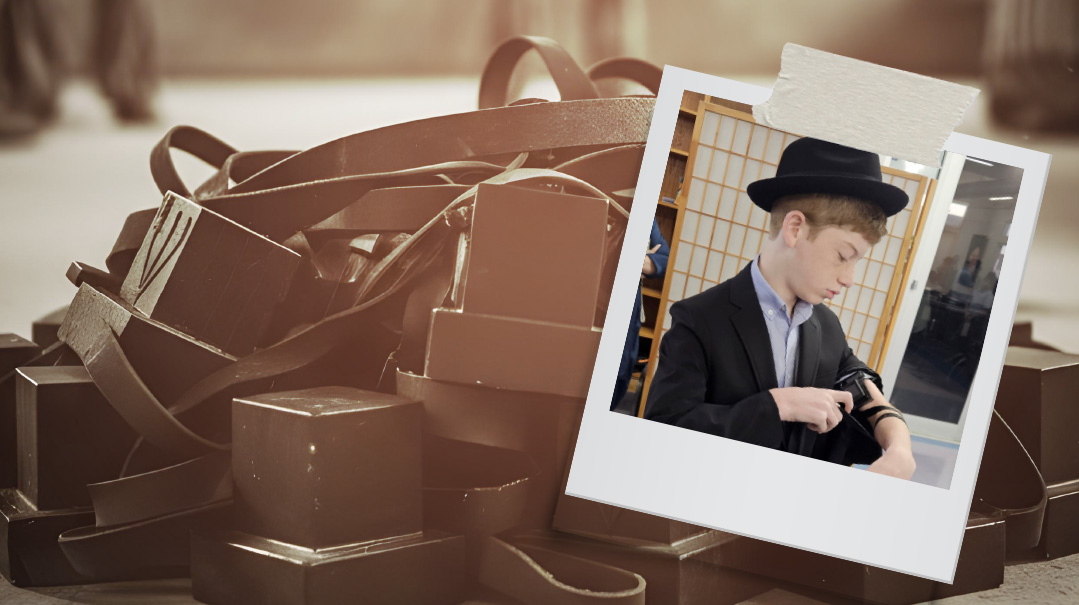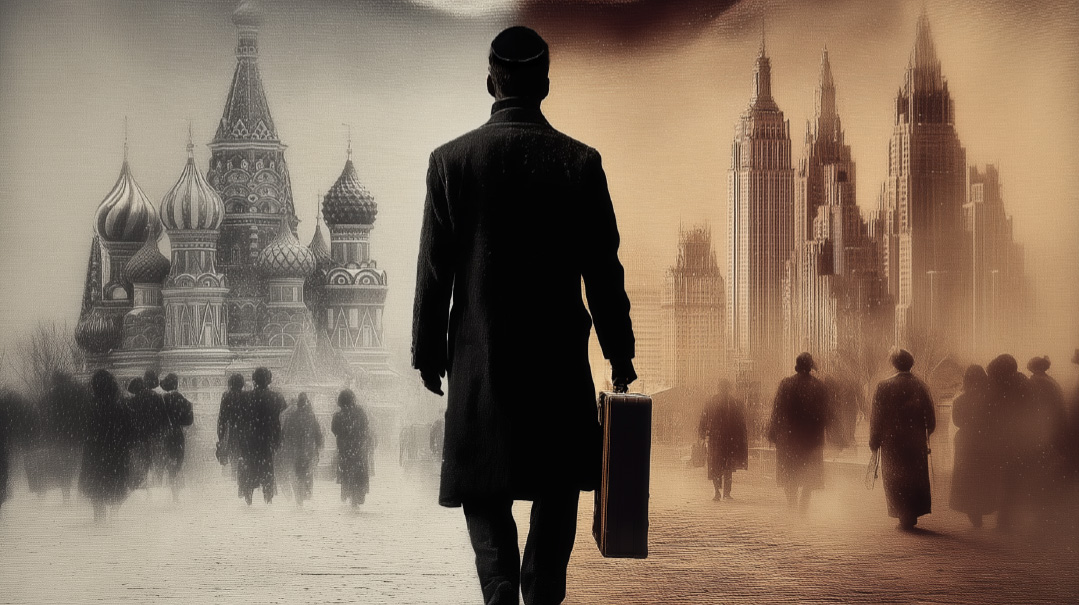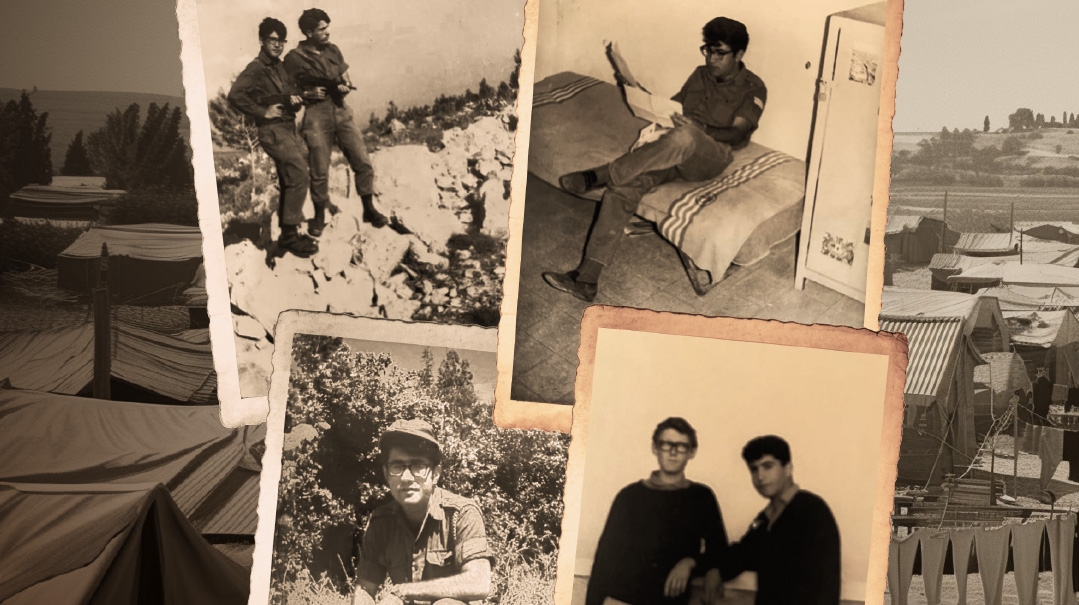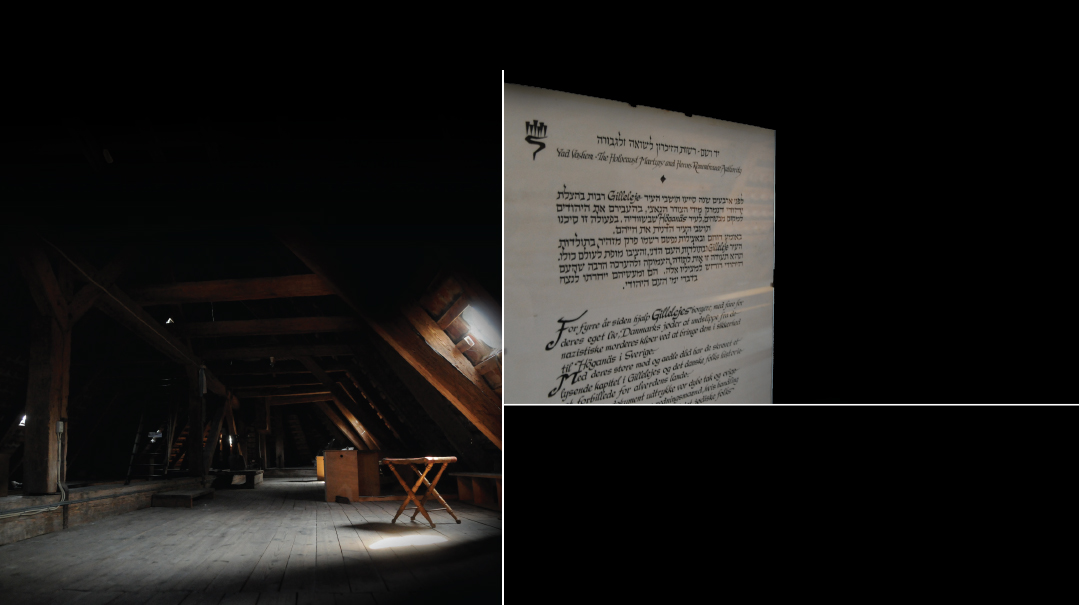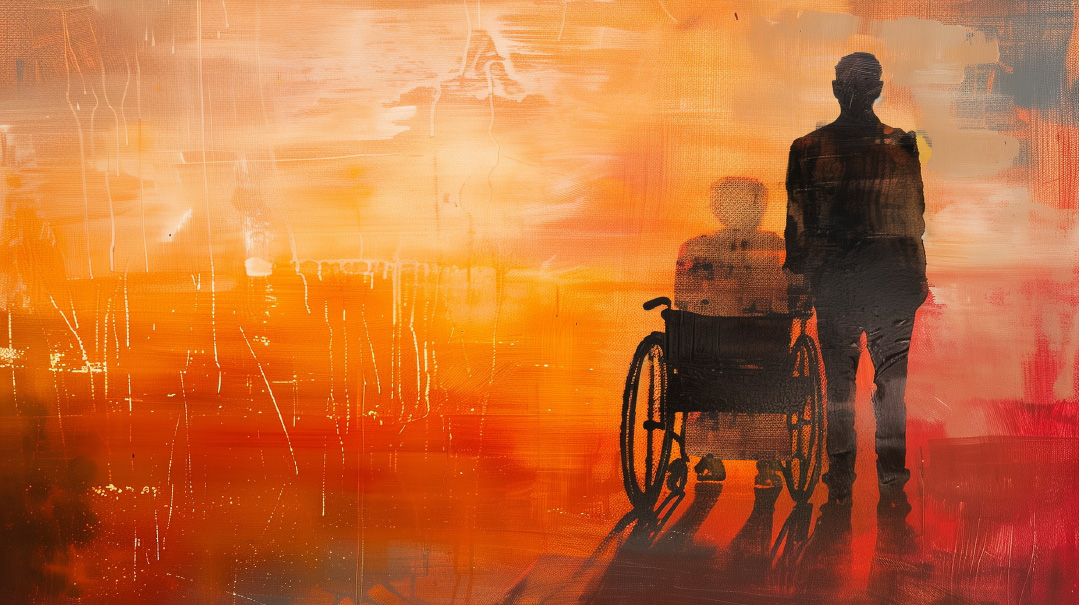Impressions: Follow Your Leader
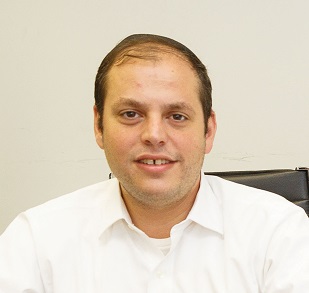
How awkward — how could she call this venerated rosh yeshivah in his seventies “Dani” in front of two bochurim?
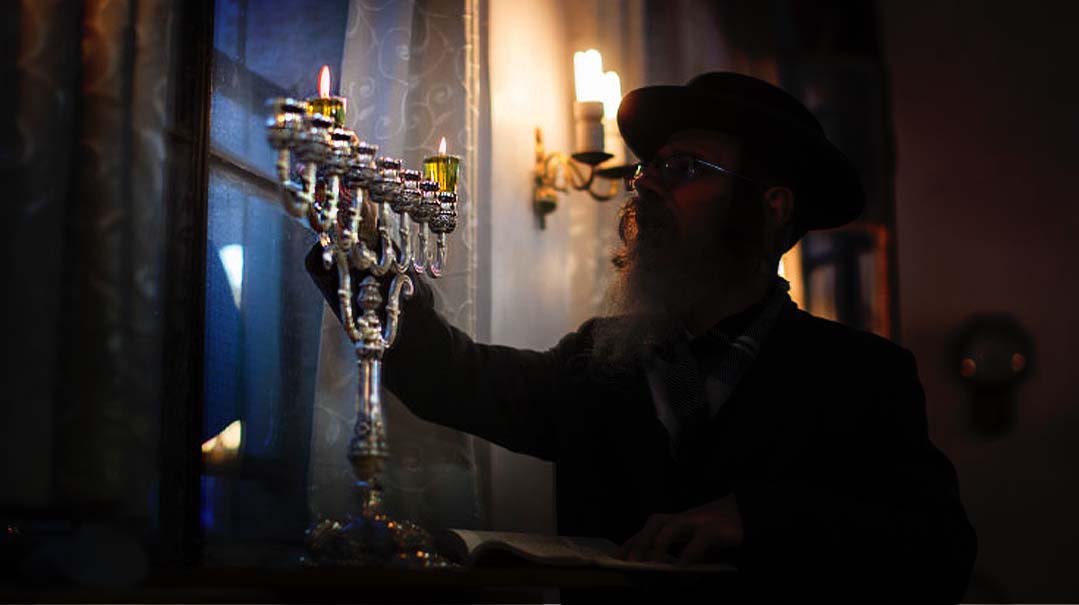
Looking back, I think that was the first year I truly experienced Chanukah. Since then, Chanukah hasn’t been the same — but you know what? Neither has life….
I was 19 then, maybe 20, and I left Eretz Yisrael to learn in a yeshivah in New York for a while. One day during Chanukah, when the snow was piled up on the freezing sidewalks, a friend and I were invited to the house of a well-known rosh yeshivah for a private party — two Israelis who were a bit out of place and needed a little warmth from home.
We were two bochurim, foreigners, and somehow we got to the Rosh Yeshivah, who himself had grown up in Eretz Yisrael and was an acquaintance of my friend’s parents. He understood our situation and went out of his way to invite us over for a festive supper that his rebbetzin prepared for us. We met in his beis medrash, where we went over to the Rosh Yeshivah and deferentially introduced ourselves. We walked him home, and, having encountered several roshei yeshivah during our learning years, braced ourselves for what was coming next. We expected to be peppered with lomdishe questions such as what the Chanukah mitzvah was — the hadlakah or the hachanah — but we were pleasantly surprised. The Rosh Yeshivah realized that this wasn’t the time for halachic conversations. He practically danced his way home and spoke with us about ourselves, showing genuine interest in us. We felt warm inside, despite the freezing temperature.
There was another surprise once we reached the Rosh Yeshivah’s house. The Rebbetzin was cheerfully standing outside the house, waiting to greet us. Before we had a chance to wonder why she was waiting for us in the frigid cold, she called out, “Oh, Dani, I’m so happy you brought them!” She then addressed us in her American-accented Hebrew. “You know, all the guests that my Dani brings with him are so interesting, so nice. Come inside, don’t stand in the cold!”
More than ten years have passed since then and I still feel the burn of my blushing cheeks; I imagined that my face was lit up like the neon billboards in Times Square. How awkward — how could she call this venerated rosh yeshivah in his seventies “Dani” in front of two bochurim? I was sure the Rosh Yeshivah wanted to die of embarrassment. Ribbono shel Olam, not only are we in galus in America, but we also have to undergo such bizyonos!
I suddenly realized that the Rosh Yeshivah didn’t seem perturbed at all. On the contrary, his natural cheerfulness only seemed to intensify. He turned to us with a big smile and made the formal introduction. “This is Rebbetzin Sherry, she’s the real rosh yeshivah here. She’s the mother of the yeshivah — she was zocheh to be like Sarah, Rivkah, Rochel, and Leah together. You’re young bochurim, but soon you’ll be in shidduchim — may you merit wives so righteous!”
While he turned to take off his kapote, I whispered to my friend, “Is this what Americans are like?” We figured we should just take it all in stride — but didn’t realize that this was just the promo; the full story would soon unfold.
I was young then, but through all the years since, I’ve never seen a couple their age acting as if they were in the middle of sheva brachos. From the minute her husband walked in, the Rebbetzin doted on him, bringing a hatbox and a coat hanger.
“Dani, how was the shiur? Did it go well? Did you manage to explain it to them the way you wanted to?”
The Rosh Yeshivah answered her with infinite respect and patience. “Ninety percent, Sherry, not everything. I didn’t manage everything, but what I did manage went very well.”
“What happened, Dani?” she asked. “Again there was somebody there who thought he was smarter than you? They asked you more klutz kashes? You know, Dani, I think you need to put all those smarty-pants in their place. You give them too much confidence. How can you let them disrupt your brilliant shiur?”
The Rosh Yeshivah smiled at her with obvious affection. “Don’t be angry with them, Sherry. Actually, this time it wasn’t the questions that held me up. It’s simply that it’s a complicated sugya, and it took more time to explain.”
The Rebbetzin was mollified. “Okay, you know what you’re doing — you’re the maestro.” Then she turned to us. “Guys, isn’t he number one? He’s the smartest person I know! And you’re all probably starving. Let’s sit down to eat.”
She looked at him with such admiration, we didn’t know where to put ourselves. We knew the Rosh Yeshivah as a massive talmid chacham, a real masmid and tzaddik, someone respected by the gedolei hador. But this was new — such an unabashed, open relationship alongside the Rosh Yeshivah’s tzidkus and hasmadah?
We all sat down together around the island in the spacious kitchen. Pots were simmering on the cooktop and the oven was going full blast. The aromas made our mouths water, but we realized that for them it was no big deal — every day was a party in this house, a veritable nest of love and friendship.
“You know,” the Rebbetzin told us after we had washed and started on the fresh rolls and dips, “when Dani goes to yeshivah to say his shiur, I say some Tehillim for him. I ask HaKadosh Baruch Hu to help him say it well.”
Although they both gave us their full attention, they couldn’t hide the special bond they shared. “Her Dani” was her entire life. She didn’t know exactly what he was learning or teaching, or how things worked in yeshivah, but she knew that what her Dani did was the best in the world.
The Rebbetzin was a gifted cook and the meal was unforgettable. After the feast the Rebbetzin announced that she had a story to tell us: “Our Chanukah miracle,” she said. “I think you’ll find it very interesting.” Let’s just say that we didn’t have any pressing engagements, so why not? We settled back in our chairs, opened our belts a couple notches, and listened to a story that would change our lives. Here is what she told us:
The Shidduch
I was an only child. My parents owned a giant pharmaceutical company, and when I was born, my mother decided to leave the business and dedicate herself to raising her princess. She dedicated her entire life to me, and I really was raised like a princess, showered with love and devotion.
Everything was perfect. But then, when I was 17, tragedy struck. My mother was diagnosed with a rare, incurable degenerative disease. My father recruited the entire research department of his company to find a cure, contacted specialists around the world, and spent huge sums of money, but her health deteriorated nonetheless. At first only her hand was paralyzed, then her legs, and finally her entire body. Tatty stopped working, I left school, and we spent her last months together with her. My father and I were left alone in the world, shattered and broken. We didn’t know how we would go on.
Everyone came to the shivah. I sat there on my own, and most of what people said went right past me. Part of time I closeted myself in my room — I couldn’t bear to deal with all the questions and comments. But on one of the days, my father called me over. A good friend of his from Eretz Yisrael had flown in especially and wanted to be menachem me also. I overheard him telling my father that he would come by on the Motzaei Shabbos after the shivah to discuss the issue again.
When he came by again, I found out that this was an old friend of my father’s, who collected funds for Yeshivas Chevron in Eretz Yisrael. The first thing Tatty did was to take out his checkbook and write a check for $18,000. Back then, that was an enormous amount of money, like over a $100,000 today. My father motioned to him, and then the fellow opened his attachי case and took out a pile of pictures — pictures of the bochurim in the yeshivah. Then it clicked — Tatty had asked him to help find me a shidduch! My father was desperate that our little family should continue, and as a businessman he knew how to single-mindedly focus on a project. We looked through the pictures and suddenly I saw my Dani. His face shined through even in the black-and-white picture, as though the sun itself were shining.
Tatty’s friend tsk-tsked. “He’s an incredible bochur, really perfect. The problem is that he’s an eltereh bochur. He’s already 28, and you’re just 18.” I in turn replied that I didn’t care how old he was, I wanted to meet him.
Tatty smiled. “There’s another small problem,” my father said. “There are another two parties involved — the young man and me. He’ll have to run the business one day, and I want to see if he’s capable, if he’s trustworthy. And even if I agree, we’ll have to wait and see what he says.”
Years later Dani told me that when the shadchan called, he didn’t know what to do. He was an older bochur and wasn’t getting good offers, so he went to discuss the offer with his rosh yeshivah. Dani had his doubts — there was the age difference, the different mentality, but mostly the immutable condition that my father set: My husband would join the company. Dani wanted to learn, not work.
His rosh yeshivah heard him out, made a few calls, and ultimately decided that Dani should go ahead. “She’s a girl with good middos. That’s the most important thing. Regarding staying in learning, b’derech she’adam rotzeh leileich molichim oso [Hashem helps a person along the path he wants to take]. If they see that you really want to learn, you’ll see that it will work out.” To make a long story short, after many transatlantic phone calls between all the parties involved, Dani finally came to America.
My father went himself to pick Dani up from the airport and drop him off at the Mirrer Yeshivah. Dani wanted to be based in a yeshivah while we were going out, and so Tatty arranged with Mir for him to have a room in the dorm. Tatty was a major donor and the administration was happy to have a way to give something back to him. They went out of their way to make Dani comfortable. I remember waiting for my father to come home, burning with curiosity. I had to hear what he thought. As soon as he walked in, I saw that he was pleased. “You have good judgment,” he said. “He’s really perfect.”
After meeting a few times, I was thrilled to discover that he was much more than I thought. He was interesting, smart, and sensitive. He was a yerei Shamayim and a tremendous masmid to boot. He simply loved to learn, more than anything else in the world. He told me about his world, his life, his learning. He was also open to me about his sadness in having to give up learning that he so loved. He knew what he was getting into when he agreed to the shidduch, and he also knew that the main purpose in life is to do Hashem’s Will at every moment. If this was how things came about, then this is what he had to do.
I didn’t answer. I was an American girl who grew up with a silver spoon in her mouth. I wanted a successful husband, a businessman, someone who would bring a lot of money home. I heard the pain in his voice, but I told myself that he’d get over it. Dani would learn how things work here. He’d realize that you could work hard, and still learn a daf Gemara, and be a good Jew. He was very bright and would certainly do well in the business; he would forget his old dreams and have new ones. I only told my father that it was preferable not to discuss the issue until after we got engaged because it would upset Dani, and I wanted him to be happy.
The Deal
We were engaged, in a gutte shaah, and Tatty was so happy! The chassan gifts he bought — whatever money could buy in America! The watch was a handmade gold Patek Phillipe, there were diamond Cartier cufflinks and a collector’s edition Mont Blanc pen set. My father also bought him the largest Shas I’d ever seen, and had me choose the leather binding to match the decor of the living room that I was planning. That’s the Shas right there in the bookcase in the living room. You’ve probably never seen anything like it.
My father and I weren’t surprised that of all the gifts, Dani appreciated the Shas the most. Of course he thanked us for everything, but what he talked about was the seforim. How special it was, how easy it was to read from — we realized that at least with one present we got it right, and were happy that he was so pleased.
My father wanted Dani to start getting into things, and as the wedding got closer, he introduced his future son-in-law to more people in the company. They all liked him and respected him. Nu, that’s no surprise, Dani is very special…. They also all knew, of course, that Dani would be the boss in the future, and wanted to impress him, but it wasn’t just that. Dani really charmed everybody. Whenever my father came back from one of these meetings, he was so enthusiastic. “He’s a genius. He grasps things in seconds. He knows exactly what needs to be done. What a head he has on his shoulders!”
When I spoke to Dani about it, however, I saw that it really didn’t interest him. He went with Tatty because he had to. I was able to hear in his voice what really interested him, and what he was doing just to go through the motions. Tatty also noticed something, but he put it down to Dani being afraid to take a senior position right away, so he decided to carve out a role tailor-made for him as a first step. But I knew the truth….
Our wedding was right before Chanukah, and the last sheva brachos was to be lunch, on a Tuesday, the fifth day of Chanukah. The arrangement was that right after the sheva brachos Dani would visit the office to start learning the ropes, to get things going before the holiday season started in America.
Monday night, Dani tried to talk to me about it again — maybe there was some arrangement that would allow him to stay with his beloved Gemaras, but I knew it wouldn’t work. He couldn’t sit and learn all day after the wedding. First of all, he promised, and that was the only reason Tatty agreed to go ahead with the shidduch. Secondly, he just couldn’t do it to my father. Tatty dreamed of the day that he would turn the business over to his successor, and the only possible successor was my husband…. Besides, my friends who were already married had husbands who worked and made money. It’s true that we had enough money so that nobody really had to work, but that wasn’t the point. A husband who learned? Not for me!
I tried to be a good wife. I consoled him with all my heart. I really did feel bad for him. “Dani,” I said, ‘it will take a little time, but you’ll get used to it. It’s okay, all new beginnings are hard.” Dani didn’t want to spoil my happiness and gave a small smile, but I knew that it wasn’t real. He went to the living room and took out a volume of the Shas, and told me, “Sherry, if I’m leaving them tomorrow, then let me say goodbye. I want to sit alone with my seforim for a while. This might be the last time I’ll be able to so without stress.”
He sat and delved into his Gemara, and in the meantime I went to lay out his clothing for the next afternoon. I ironed a blue dress shirt, took out a matching tie, and took his most expensive suit — purchased by my father, of course — out of the closet. Let them all see who my Dani was. I went to rest a bit until he was done, but I must have dozed off. When I awoke a few hours later, I realized that Dani wasn’t in bed. The light was still on in the living room, and I got up to investigate. There was Dani, his head resting on an open page, fast asleep. I looked closer, and saw that the page was wet. Really wet. My heart went out. This man, whom I so wanted to marry and for whom I promised myself that I would do everything to make happy, had cried the whole night. He cried together with his giant Gemara. I suddenly felt terrible pangs of conscience. I told myself, “What are you doing? Why? How can you be a party to making your husband so unhappy? Look how he fell asleep in despair over his Gemara. You see that this is really his life, just let him be!” But I couldn’t do it. He promised. And there was also Tatty, and all of our friends. It just wasn’t possible.
The Dream
Our last sheva brachos was the grandest of all. It was in the main shul in our neighborhood and the entire kehillah came. Tatty stood to speak, full of emotion and pride, and introduced Dani to everyone. Then Dani got up to speak. Now, you both know that my Dani is an excellent speaker. When he speaks, even the birds stop chirping to listen. Back then, though, Dani didn’t speak English so well, but it didn’t matter. Dani started dramatically. “Everyone here has heard of Yehudah HaMaccabee who defeated the Greeks. I’m sure that you’ve also heard of the great victory at the battle of Beit Choron that was the catalyst for the entire nation to unite under his leadership, but I’m also pretty sure that you never heard about the dream Yehudah had the night before that decisive battle.”
He got everyone’s attention. In the audience sat talmidei chachamim, scientists, professors, but no one had ever heard of this dream. Even the women, who were talking among themselves the whole time, stopped to hear what he had to say.
“You know,” Dani continued, “whoever reads Sefer Maccabim can’t understand how Yehudah expected to fight that battle. They were so few, untrained without weapons, undernourished and tired, but the main problem was that they didn’t believe in themselves. They were sure that going out to do battle was suicidal, more of a kind of useless act of protest than a real military strategy. The soldiers were bitter and angry with their commanders — ‘Who needs this? It’s completely crazy! We can’t fight the whole world! Yehudah, let’s see you arrange normal food for us before trying to sell us grandiose schemes of defeating entire nations.’
“But listen to what happened,” Dani continued. “Yehudah heard the opposition, he saw the discouragement, and he felt the hunger and weariness and decided that he had to rethink his course of action. He understood that if this was the attitude of his men, then he had no chance of success, and considered surrendering in return for clemency. He was also very tired and discouraged, and while pondering just giving up, he fell asleep. He fell asleep, and dreamed a dream. In his dream, he saw himself walking out to his men, announcing, ‘Friends, you are right. I made a mistake. It’s over. We can’t fight like this, it’s impossible to win. We have no reason to commit suicide. If Hashem wants to save us, he’ll find the way; we made our hishtadlus. We don’t have to do more than this. Whoever wants is free to go home. It would be wise to hurry, before the Greeks come. We’re surrendering.’
“The soldiers scattered in all directions, fleeing for their lives. Yehudah saddled his horse and rode out to the Greek camp to ask for clemency. The news spread quickly: Yehudah HaMaccabee surrendered! The rebels disbanded, the rebellion was over.
“Yehudah felt that he did the right thing. He prevented a bloodbath and stopped the unwinnable uprising before it got out of control. On his way back home, he was sure he would be received with respect, for having prevented needless bloodshed and stopping a war, but he was in for a surprise. Wherever he went, he was met with deep disappointment. He couldn’t understand it — what had he done wrong? What was his mistake? What did they expect — that he should act irresponsibly? He felt as if there was some secret that everyone else knew and that he wasn’t privy to.
“And then, in the dream, he heard a voice speaking to him: ‘Yehudah! You are a leader. A leader doesn’t let the circumstances direct him; he creates the circumstances. As a leader, they all expected you to live up to your role. They looked to you to create a new reality. A reality in which victory is possible, because you created a new spirit, you changed the narrative. They looked up to you in expectation that you would infuse them with a spirit of victory. That’s the difference between you and them. They react to the current state of affairs, but you, as a leader, must act according to the vision in your heart — the heart of a leader. But you didn’t — you gave in. Instead of leading them, you joined them. You became like them, accepting the situation. You agreed to give up your spirit, your vision, your courage, everything that you could have as a leader. A leader is the standard-bearer. You failed. You failed, and everyone failed. When you gave up, everyone gave up. You failed, Yehudah….’
“With those last stinging words still ringing in his ears, Yehudah woke up, shaken. It took a few minutes to realize it was only a dream — nothing had happened yet. He breathed a deep sigh of relief, and at that instant he knew what he had to do. This was the defining moment of the rebellion, and of his leadership. He rushed out and cried out: ‘Mi l’Hashem eilai! Everyone come to me!’ And they all came….”
The Mission
The audience at the sheva brachos was rapt; the women were crying. Dani took a piece of paper out of his pocket and announced, “I want to read you what Yehudah HaMaccabee said to his men before they went out to wage battle at Beit Choron.” And he began to read: “ ‘It is not a big thing for the many to fall to the few, because Heaven has no difficulty in saving the many or the few. Victory does not come from great numbers, it comes from Hashem. They are coming to attack us with haughtiness, intending to wipe us out, together with our wives and children, and to make a mockery of us. We are fighting for our lives and our Torah. Hashem will drive them from us, you have nothing to fear.’ As soon as Yehudah finished speaking, the Greeks suddenly were upon them, and the end result was that the Greeks fell before them.
“Do you understand what happened here?” Dani asked. “Do you know how miracles happen? How the Chanukah miracle happened? Because of one Jew! A Jew who decided to create a new reality for his soldiers, who would never give in to the voices of despair that tried to shatter his dream. The dream to save the souls and the Torah of his people.
“That’s how he created the neis. The truth is every one of us is a leader. Everyone one of us is in charge of his own life. He’s a leader who has to navigate between all of the internal voices within — the voices that complain, the voices that express doubt and weakness, the cynical voices, the small-minded ones — all the voices that try to drown out the voice that knows exactly what to do. The voice of Yehudah HaMaccabee.
“If that special voice is silenced by all the other voices, all that’s left is deep disappointment and a sense of failure that will haunt you for the rest of your life. Instead of leading, you were led. How depressing, how disappointing, how painful…. You all know that I am new in this country, and you welcomed me so graciously. I truly wish to bless you from the bottom of my heart — it doesn’t matter what your own dream is, as long as it comes from deep inside your soul. Never let go of it. Be the guiding light of your own lives, and of those around you. The main thing is, don’t give up, and don’t give in!”
Everyone was in tears; my father’s pride knew no bounds. They embraced for a long time and it was clear that Tatty was feeling my mother’s absence very strongly. That speech was the talk of the town. I have to tell you, that although 50 years have passed, I still receive comments about it. Until today people come over to me and tell me that it changed their life.
The Miracle
Well, the party ended. The three of us drove home together so that Dani could change clothes and get ready to visit the office. We were quiet the whole way. My father said that he would wait in the car until Dani was ready. I saw Dani’s pain, and I really felt bad, but there was nothing that I could do. Dani put on the shirt and suit I prepared for him. Just before he went down to join my father he turned to me and said, “Sherry, I’ll take the Gemara with me to work. Maybe I’ll find a few minutes to use it.” I felt a suspicious lump in my throat.
He left, with the giant volume tucked under his arm, and I watched from the window. It started to rain, but it didn’t seem that Dani even noticed. He looked so different than he did only an hour before. When he stood in front of the crowd and spoke, he seemed so powerful and so authoritative. Now he looked like a popped balloon. Bent, miserable, so out of place.
I saw my father wave to him from the car. I was glued to my spot. I knew that a minute later Dani would be on the way to his new life and there may be no way back. And then Dani’s words came back to me: “Be the guiding light of your own lives, and for those around you. Don’t let the voices of ‘reality’ confuse you!” And suddenly, I heard my own “Yehudah HaMaccabee” voice speak from deep inside of me and I knew what I had to do. In that fraction of a second, everything was illuminated.
I opened the window and called out, “Ta, wait a minute!” I ran as fast as I could to the car, past Yehudah, and practically fell over my father, tears flowing freely. The lump in my throat that had been growing all day broke out at that moment.
My father turned white. “What happened, bubaleh? Tell me!”
I was trembling all over, maybe from the cold, maybe from the rain, maybe from emotion. “Ta, do you love me?”
He looked at me strangely. “‘How can you even ask me that? You are my entire life! What happened? Answer me!” He was panicking.
I whispered in his ear through my tears, “If you truly love me, let him sit and learn. Tatty, let him go. I can’t take it, I can’t do it to him. Look at him, see how miserable he is. Ta, I want Dani to stay in learning. I want him to be happy. I don’t want you to bring him into the business.” My father was in total shock.
I knew him well. I knew what was going through his head. The gears in his brain were spinning, trying to cook up a deal, to work out some compromise that would calm me down but leave Dani with him. I didn’t want a deal, I wanted a miracle. I whispered again, “You don’t understand what this is about. He cried the whole night over having to leave his Gemara — and then he couldn’t resist and is schlepping it with him. Did you ever see someone go to work with a huge Gemara like that? Don’t you realize what’s going on here? I want my husband to be happy. Tatty, just leave it. We’ll find somebody else.”
There was silence. All I heard was the sound of the falling rain and my beating heart. And then the neis happened. Our own personal Chanukah miracle. My father looked into my eyes, into my soul. He understood that my plea came from the deep truth inside me.
And what about Dani? He stood confused next to the car, his big Gemara dripping wet, and didn’t know what to do. He still didn’t grasp the miracle that had just occurred. I said to my father aloud, so Dani would also hear, “Ta, can you do us a favor? My Dani has to get to Mir. They started early today because of candlelighting. This way maybe he’ll still be able to learn something today.”
Dani, now the one in shock, got into the car and drove to yeshivah in his business suit and blue shirt. From that day on all he does is sit and learn, and I’m still basking in the great neis that happened to me, to him, and to my father as well. In the end, the company did just fine, and my father’s pride for Dani never ceased, because Dani was the real thing. He became a great talmid chacham and mechaber seforim, and a well-known rosh yeshivah with talmidim all over the world.
Wow, that was some story. I raised my eyes to see how the Rosh Yeshivah was taking it — but wouldn’t you know it, he was long-gone, having left the kitchen for one of those hand-bound huge Gemaras.
The Rosh Yeshivah and his wife, so close in life, were also not separated in death. They passed away a few years ago, within two weeks of each other. Their names and some details of their personal lives have been changed to protect the family’s privacy, but their personal Chanukah miracle is surely continuing to bring great light into the world.
(Originally featured in Mishpacha, Issue 689)
Oops! We could not locate your form.






